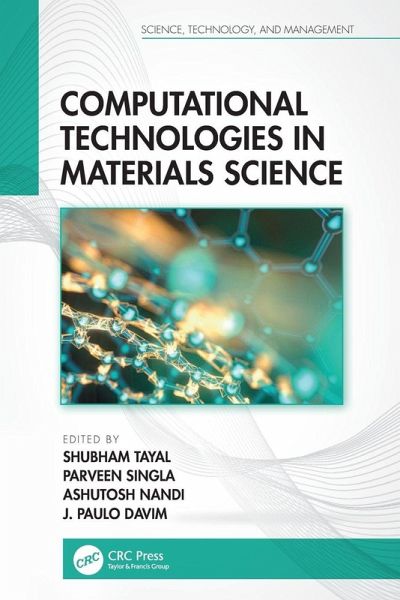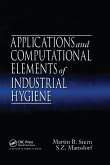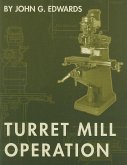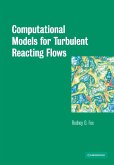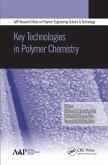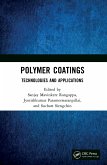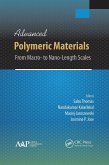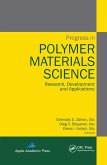Computational Technologies in Materials Science
Herausgeber: Tayal, Shubham; Davim, J Paulo; Nandi, Ashutosh; Singla, Parveen
Computational Technologies in Materials Science
Herausgeber: Tayal, Shubham; Davim, J Paulo; Nandi, Ashutosh; Singla, Parveen
- Broschiertes Buch
- Merkliste
- Auf die Merkliste
- Bewerten Bewerten
- Teilen
- Produkt teilen
- Produkterinnerung
- Produkterinnerung
This book addresses topics related to AI, machine learning, deep learning, and cloud computing in materials science. It brings together researchers, developers, practitioners, and users to explore new ideas, techniques, and tools, and to exchange their experiences.
Andere Kunden interessierten sich auch für
![Applications and Computational Elements of Industrial Hygiene. Applications and Computational Elements of Industrial Hygiene.]() Martin B SternApplications and Computational Elements of Industrial Hygiene.93,99 €
Martin B SternApplications and Computational Elements of Industrial Hygiene.93,99 €![Turret Mill Operation Turret Mill Operation]() John G EdwardsTurret Mill Operation61,99 €
John G EdwardsTurret Mill Operation61,99 €![Computational Models for Turbulent Reacting Flows Computational Models for Turbulent Reacting Flows]() Rodney O. FoxComputational Models for Turbulent Reacting Flows112,99 €
Rodney O. FoxComputational Models for Turbulent Reacting Flows112,99 €![Key Technologies in Polymer Chemistry Key Technologies in Polymer Chemistry]() Key Technologies in Polymer Chemistry111,99 €
Key Technologies in Polymer Chemistry111,99 €![Polymer Coatings: Technologies and Applications Polymer Coatings: Technologies and Applications]() Polymer Coatings: Technologies and Applications96,99 €
Polymer Coatings: Technologies and Applications96,99 €![Advanced Polymeric Materials Advanced Polymeric Materials]() Advanced Polymeric Materials112,99 €
Advanced Polymeric Materials112,99 €![Progress in Polymer Materials Science Progress in Polymer Materials Science]() Progress in Polymer Materials Science112,99 €
Progress in Polymer Materials Science112,99 €-
-
-
This book addresses topics related to AI, machine learning, deep learning, and cloud computing in materials science. It brings together researchers, developers, practitioners, and users to explore new ideas, techniques, and tools, and to exchange their experiences.
Hinweis: Dieser Artikel kann nur an eine deutsche Lieferadresse ausgeliefert werden.
Hinweis: Dieser Artikel kann nur an eine deutsche Lieferadresse ausgeliefert werden.
Produktdetails
- Produktdetails
- Verlag: CRC Press
- Seitenzahl: 238
- Erscheinungstermin: 29. November 2024
- Englisch
- Abmessung: 234mm x 156mm x 13mm
- Gewicht: 358g
- ISBN-13: 9780367640583
- ISBN-10: 0367640589
- Artikelnr.: 71905564
- Herstellerkennzeichnung
- Libri GmbH
- Europaallee 1
- 36244 Bad Hersfeld
- 06621 890
- Verlag: CRC Press
- Seitenzahl: 238
- Erscheinungstermin: 29. November 2024
- Englisch
- Abmessung: 234mm x 156mm x 13mm
- Gewicht: 358g
- ISBN-13: 9780367640583
- ISBN-10: 0367640589
- Artikelnr.: 71905564
- Herstellerkennzeichnung
- Libri GmbH
- Europaallee 1
- 36244 Bad Hersfeld
- 06621 890
Dr. Shubham Tayal is Assistant Professor, Department of Electronics and Communication Engineering, SR University, Warangal, India. He has more than 6 years of academic/research experience of teaching at UG and PG level. He has received his B.Tech (ECE) from Maharishi Dayanand University, Rohtak, M.Tech (Electronics) from YMCA University of Science & Technology, Faridabad and PhD from National Institute of Technology, Kurukshetra. He has published several papers in various international journals and conferences of repute and many papers are under review. He is on the editorial and reviewer panel of many international journals. He has received Green ThinkerZ International Distinguished Young Researcher Award 2020. His research area includes semiconductor devices, VLSI design, device-circuit co-design issues, machine learning and IOT. Dr. Parveen Singla is Professor, Electronics & Communication Engineering, Department of Chandigarh Engineering College- Chandigarh Group of Colleges, Landran, Mohali, Punjab. He received the Bachelor of Engineering in Electronics & Communication Engineering with honors from Maharishi Dayanand University, Rohtak, Master in Technology in Electronics & Communication Engineering with honors from Kurukshetra University, & PhD in Communication Systems from IKG Punjab Technical University, Jalandhar, India. He has 16 years of experience in the field of teaching and research. He has published more than 35 papers in various reputed journals and national and international conferences. He also organised more than 30 technical events for the students in order to enhance their technical skills and received Best International Technical Event Organiser Award. He is the guest editor of various reputed journals. His interest area includes drone technology, wireless networks, smart antenna and soft computing. Dr. Ashutosh Nandi is Assistant Professor with the Department of Electronics and Communication Engineering, National Institute of Technology Kurukshetra, India. He received the Ph.D. degree from IIT Roorkee, India, in 2015. He has authored more than 50 articles in various international journals and conferences of repute. His current research interests include low-power very large scale integration design, device circuit codesign in the digital/analog domain, and device modeling of multigate semiconductor devices. Dr. J. Paulo Davim received his Ph.D. degree in Mechanical Engineering in 1997, M.Sc. degree in Mechanical Engineering (materials and manufacturing processes) in 1991, Mechanical Engineering degree (5 years) in 1986, from the University of Porto (FEUP), the Aggregate title (Full Habilitation) from the University of Coimbra in 2005 and the D.Sc. (Higher Doctorate) from London Metropolitan University in 2013. He is Senior Chartered Engineer by the Portuguese Institution of Engineers with an MBA and Specialist titles in Engineering and Industrial Management as well as in Metrology. He is also Eur Ing by FEANI-Brussels and Fellow (FIET) of IET-London. Currently, he is Professor at the Department of Mechanical Engineering of the University of Aveiro, Portugal. He is also distinguished as honorary professor in several universities/colleges. He has more than 30 years of teaching and research experience in Manufacturing, Materials, Mechanical and Industrial Engineering, with special emphasis in Machining & Tribology. He has also interest in Management, Engineering Education and Higher Education for Sustainability. He has guided large numbers of postdoc, Ph.D. and master's students as well as has coordinated and participated in several financed research projects. He has received several scientific awards and honors. He has worked as evaluator of projects for ERC-European Research Council and other international research agencies as well as examiner of Ph.D. thesis for many universities in different countries. He is the Editor in Chief of several international journals, Guest Editor of journals, books Editor, book Series Editor and Scientific Advisory for many international journals and conferences. Presently, he is an Editorial Board member of 30 international journals and acts as reviewer for more than 100 prestigious Web of Science journals. In addition, he has also published as editor (and co-editor) more than 150 books and as author (and co-author) more than 15 books, 100 book chapters and 500 articles in journals and conferences (more than 250 articles in journals indexed in Web of Science core collection/h-index 55+/9500+ citations, SCOPUS/h-index 60+/12000+ citations, Google Scholar/h-index 77+/19500+ citations).
Chapter 1 Fabrication and Characterization of Materials Chapter 2
Application to Advanced Materials Simulation Chapter 3 Molecular Dynamics
Simulations for Structural Characterization and Property Prediction of
Materials Chapter 4 Desirability Approach-Based Optimization of Process
Parameters in Turning of Aluminum Matrix Composites Chapter 5 Spark
Plasma-Induced Combustion Synthesis, Densification, and Characterization of
Nanostructured Magnesium Silicide for Mid Temperature Energy Conversion
Energy Harvesting Application Chapter 6 The Role of Computational
Intelligence in Materials Science: An Overview Chapter 7 Characterization
Techniques for Composites using AI and Machine Learning Techniques Chapter
8 Experimental Evaluation on Tribological Behavior of TiO2 Reinforced
Polyamide Composites Validated by Taguchi and Machine Learning Methods
Chapter 9 Prediction of Compressive Strength of SCC-Containing Metakaolin
and Rice Husk Ash Using Machine Learning Algorithms Chapter 10 Predicting
Compressive Strength of Concrete Matrix Using Engineered Cementitious
Composites: A Comparative Study between ANN and RF Models Chapter 11
Estimation of Marshall Stability of Asphalt Concrete Mix Using Neural
Network and M5P Tree
Application to Advanced Materials Simulation Chapter 3 Molecular Dynamics
Simulations for Structural Characterization and Property Prediction of
Materials Chapter 4 Desirability Approach-Based Optimization of Process
Parameters in Turning of Aluminum Matrix Composites Chapter 5 Spark
Plasma-Induced Combustion Synthesis, Densification, and Characterization of
Nanostructured Magnesium Silicide for Mid Temperature Energy Conversion
Energy Harvesting Application Chapter 6 The Role of Computational
Intelligence in Materials Science: An Overview Chapter 7 Characterization
Techniques for Composites using AI and Machine Learning Techniques Chapter
8 Experimental Evaluation on Tribological Behavior of TiO2 Reinforced
Polyamide Composites Validated by Taguchi and Machine Learning Methods
Chapter 9 Prediction of Compressive Strength of SCC-Containing Metakaolin
and Rice Husk Ash Using Machine Learning Algorithms Chapter 10 Predicting
Compressive Strength of Concrete Matrix Using Engineered Cementitious
Composites: A Comparative Study between ANN and RF Models Chapter 11
Estimation of Marshall Stability of Asphalt Concrete Mix Using Neural
Network and M5P Tree
Chapter 1 Fabrication and Characterization of Materials Chapter 2
Application to Advanced Materials Simulation Chapter 3 Molecular Dynamics
Simulations for Structural Characterization and Property Prediction of
Materials Chapter 4 Desirability Approach-Based Optimization of Process
Parameters in Turning of Aluminum Matrix Composites Chapter 5 Spark
Plasma-Induced Combustion Synthesis, Densification, and Characterization of
Nanostructured Magnesium Silicide for Mid Temperature Energy Conversion
Energy Harvesting Application Chapter 6 The Role of Computational
Intelligence in Materials Science: An Overview Chapter 7 Characterization
Techniques for Composites using AI and Machine Learning Techniques Chapter
8 Experimental Evaluation on Tribological Behavior of TiO2 Reinforced
Polyamide Composites Validated by Taguchi and Machine Learning Methods
Chapter 9 Prediction of Compressive Strength of SCC-Containing Metakaolin
and Rice Husk Ash Using Machine Learning Algorithms Chapter 10 Predicting
Compressive Strength of Concrete Matrix Using Engineered Cementitious
Composites: A Comparative Study between ANN and RF Models Chapter 11
Estimation of Marshall Stability of Asphalt Concrete Mix Using Neural
Network and M5P Tree
Application to Advanced Materials Simulation Chapter 3 Molecular Dynamics
Simulations for Structural Characterization and Property Prediction of
Materials Chapter 4 Desirability Approach-Based Optimization of Process
Parameters in Turning of Aluminum Matrix Composites Chapter 5 Spark
Plasma-Induced Combustion Synthesis, Densification, and Characterization of
Nanostructured Magnesium Silicide for Mid Temperature Energy Conversion
Energy Harvesting Application Chapter 6 The Role of Computational
Intelligence in Materials Science: An Overview Chapter 7 Characterization
Techniques for Composites using AI and Machine Learning Techniques Chapter
8 Experimental Evaluation on Tribological Behavior of TiO2 Reinforced
Polyamide Composites Validated by Taguchi and Machine Learning Methods
Chapter 9 Prediction of Compressive Strength of SCC-Containing Metakaolin
and Rice Husk Ash Using Machine Learning Algorithms Chapter 10 Predicting
Compressive Strength of Concrete Matrix Using Engineered Cementitious
Composites: A Comparative Study between ANN and RF Models Chapter 11
Estimation of Marshall Stability of Asphalt Concrete Mix Using Neural
Network and M5P Tree

